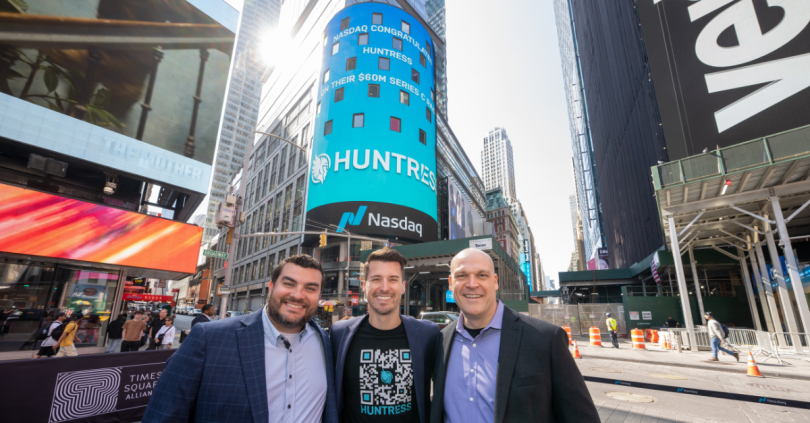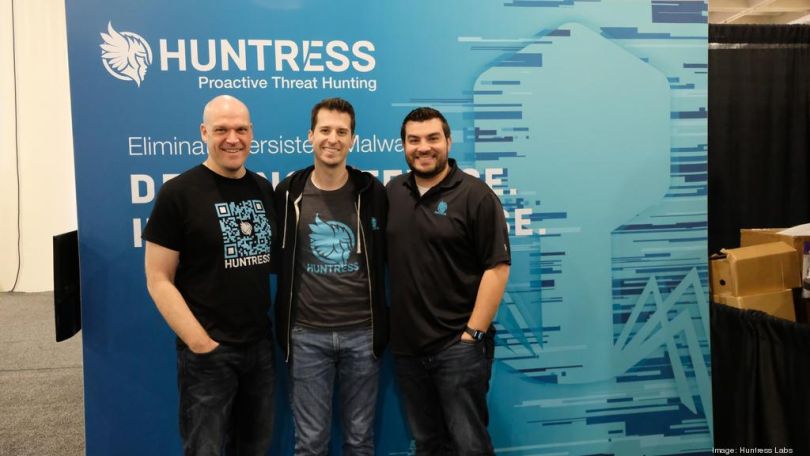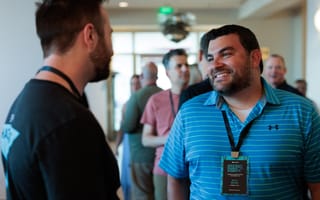In 2015, Chris Bisnett found himself at a crossroads.
He was working as a government contractor, supporting offensive cyber operations for the National Security Agency. His role? Develop tools to help operatives penetrate foreign government networks. But after years of successful missions, the excitement began to wear thin. Bisnett knew he could do more. And that’s when the idea for Huntress took shape.
Bisnett wasn’t alone in his restlessness. His co-founders, Kyle Hanslovan and John Ferrell, were feeling it too. Despite their ventures in the high-stakes world of defense contracting, they were unsatisfied and desperate for their next challenge.
As it turned out, Hanslovan had an idea he’d been toying with, a concept rooted in his offensive security expertise — a product that could pinpoint malware. Together, the co-founders recognized the limitations of traditional antivirus software, so they opted for a new approach. Drawing inspiration from Microsoft Sysinternals’ Autoruns, a tool which surveys system startup applications, they envisioned a solution that could distinguish the good from the bad, but on a massive scale.
At first, they had their doubts. Was this idea too obvious? Did Microsoft already have something similar? But early success bolstered their confidence. Leveraging Hanslovan’s connections in the National Guard, the trio showcased a Huntress prototype during government war games. Whatever doubts the founders initially had quickly dissipated, as the prototype identified malware on every single infected machine.
With a new boost of self assurance, the three founders went looking for greater support. Their first stop was Mach37, a cybersecurity accelerator, where their impressive pitch and prototype’s performance earned them acceptance and a $50K investment. The intense 16-week program ultimately equipped them with the knowledge they needed to navigate the startup landscape.
For Bisnett, the journey from skeptic to believer was life changing.
“Once Kyle told me about Mach37, I had such FOMO that I practically begged them to let me join the team to work on this,” he said. “It went from an idea some of us assumed couldn’t be workable to something that had proven it could work and that others were so interested in that they were willing to invest money into a company with only a prototype.”
“I had such FOMO that I practically begged them to let me join the team to work on this.”
Like any innovative undertaking, going from concept to reality wasn’t always easy. But armed with determination and a groundbreaking prototype, they pushed ahead.
Huntress now stands as a symbol of success born from discontent. Built In caught up with Bisnett to hear more about how his quest to make a greater impact resulted in a pioneering cybersecurity solution.

Early on, we looked up to a lot of security companies that had come before us, as well as some friends and former colleagues who had also started security companies. For us, Carbon Black and CrowdStrike were two big-name security companies that we looked up to for their approach to security. We learned a lot from what they did. Some of it became inspiration for how we built our products, and some of it became inspiration for what we wouldn’t do.
There were two big problems though. One, how could our research possibly compete with these emerging titans and incumbent juggernauts who had a massive technical head start? Two, why would anyone pay for what we were building and not choose one of the over 100 existing vendors?
“How could our research possibly compete with these emerging titans and incumbent juggernauts who had a massive technical head start?”
This is where we had to get scrappy. We started to think about who CrowdStrike wasn’t selling to, and we tried to figure out why. Kyle called a lot of local small businesses and told them we would give them our product for free and the only thing we were looking for in return was feedback. Interestingly enough, these folks consistently told us that they didn’t buy IT products directly and that they paid another company to manage all of their IT systems. We had obviously heard of outsourcing work to consultants and such, but we’d never heard of what we learned were businesses that did IT outsourcing specifically. They called themselves managed service providers.
Once we started to call these MSPs, we learned that they could open the door for us to hundreds of small businesses they served simply by convincing one MSP to purchase Huntress. This seemed like a good opportunity. And we spent a lot of time talking and working with some local folks to understand how they work and what they were expecting and not getting from other cybersecurity vendors.
We ended up learning that they weren’t generally security experts, and they couldn’t hire the experts they needed. As a result, it meant that buying the tools from Carbon Black and CrowdStrike didn’t solve their problems because they didn’t have the expertise needed to monitor and analyze the alerts generated by these tools.
That was our aha moment. If we could build security solutions that worked for these MSPs, we could sell to all the people that Carbon Black and CrowdStrike couldn’t.

What scared you the most during your first few years as a founder?
What scared us — and what I think scares most founders in the early days — is simply failure. As we started to hire folks, we were asking them to quit their other jobs and come work for us on this crazy idea. If it didn’t work out and we couldn’t pay them anymore, that’s a big burden on people and their families.
In a more selfish sense, what scared me the most about failure was that it would have meant I had to go back to work as a government contractor. And that was something I very much didn’t want to do. Many of the government contractors that I’ve worked for, or friends have worked for, aren’t the best places to work when it comes to wanting to do cool stuff and innovate. A lot of the people there are stuck in the mindset that they don’t need to move fast and they don’t need to innovate. The government has a hard enough time getting out of their own way, so they aren’t pushing these companies to do more or be more efficient.
A surprising amount of the early ideas for what we wanted the Huntress culture to be like were actually stated as what we didn’t want the company to be like. We would say things like, “We don’t want to work at a company that is OK with being mediocre.” This was a direct result of our experiences at companies we’d worked for previously and something we were looking to get away from.
“We don’t want to work at a company that is OK with being mediocre.”
Were there any moments when you felt like giving up? What pushed you to keep going?
Founding a high-growth startup is a very tumultuous journey. There are lots of ups and downs, and you tend to oscillate between the two feelings quite quickly. One minute you feel like everything is starting to come together, and the next minute you feel like all the things you’ve done for months or years are no longer working.
I’ve never met a founder who doesn’t feel like giving up at many points. This is why it’s so important to have co-founders, and ideally ones where you balance each other out. Having someone who’s always optimistic and someone who’s pessimistic will help you find the right balance between thinking things are going to work and considering alternate options in case they don’t work. Disagreements come with that contrast, though, and the team has to be able to work through those and remember that everyone wants to succeed — they just see things in different ways.
The things that kept us going were those flashes of success. Having something that you’ve been working hard toward start to come together and show progress gives a big dopamine hit and makes you feel like it is possible. This could be something like closing a big deal, finding malware or even just shipping a feature that you think will be a big hit.
What’s next for you and Huntress?
What’s next is always interesting for us because, as a high-growth company, everything is always changing. The team is growing, we’re taking on new challenges, we’re expanding to new markets, we’re launching new products, we’re fixing problems caused by growing. It’s always something, and no day is the same. Startups aren’t for people who like to wake up every day knowing exactly what their day is going to look like.
We’re going to continue shipping new products and trying to make a bigger difference in security for small and medium businesses. That’s probably the one thing that doesn’t change with time.







